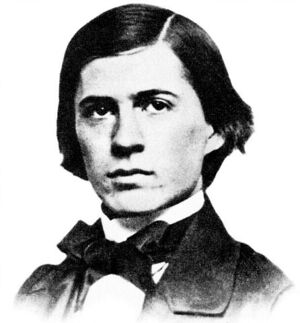Charles Sanders Peirce (nonfiction): Difference between revisions
No edit summary |
No edit summary |
||
| (7 intermediate revisions by the same user not shown) | |||
| Line 1: | Line 1: | ||
[[File:Charles_Sanders_Peirce_in_1859.jpg | [[File:Charles_Sanders_Peirce_in_1859.jpg|thumb|Charles Sanders Peirce in 1859.]]'''Charles Sanders Peirce''' (/ˈpɜːrs/, like "purse", September 10, 1839 – April 19, 1914) was an American philosopher, logician, [[mathematician (nonfiction)|mathematician]], and scientist who is sometimes known as "the father of pragmatism". | ||
He was educated as a chemist and employed as a scientist for 30 years. | He was educated as a chemist and employed as a scientist for 30 years. | ||
| Line 5: | Line 5: | ||
Today he is appreciated largely for his contributions to logic, [[mathematics (nonfiction)|mathematics]], philosophy, scientific methodology, and semiotics, and for his founding of pragmatism. | Today he is appreciated largely for his contributions to logic, [[mathematics (nonfiction)|mathematics]], philosophy, scientific methodology, and semiotics, and for his founding of pragmatism. | ||
An innovator in mathematics, statistics, philosophy, research methodology, and various sciences, Peirce considered himself, first and foremost, a logician. He made major contributions to logic, but logic for him encompassed much of that which is now called epistemology and philosophy of science. | An innovator in [[Mathematics (nonfiction)|mathematics]], statistics, philosophy, research methodology, and various sciences, Peirce considered himself, first and foremost, a logician. He made major contributions to logic, but logic for him encompassed much of that which is now called epistemology and philosophy of science. | ||
He saw logic as the formal branch of semiotics, of which he is a founder, and which foreshadowed the debate among logical positivists and proponents of philosophy of language that dominated 20th century Western philosophy. | He saw logic as the formal branch of semiotics, of which he is a founder, and which foreshadowed the debate among logical positivists and proponents of philosophy of language that dominated 20th century Western philosophy. | ||
| Line 15: | Line 15: | ||
== In the News == | == In the News == | ||
<gallery | <gallery> | ||
File:Ernst Schroeder.jpg|link=Ernst Schröder (nonfiction)|[[Ernst Schröder (nonfiction)|Ernst Schröder]] | File:Happy Charles Sanders Peirce's Birthday (10 September).jpg|Happy Charles Sanders Peirce's Birthday (10 September) | ||
File:Proof by appeal to Charles Sanders Peirce - I didn't know we could do that.jpg|Proof by appeal to Charles Sanders Peirce - I didn't know we could do that! | |||
File:Ernst Schroeder.jpg|link=Ernst Schröder (nonfiction)|[[Ernst Schröder (nonfiction)|Ernst Schröder]] has insights into the work of Charles Sanders Peirce. | |||
</gallery> | </gallery> | ||
== Fiction cross-reference == | == Fiction cross-reference == | ||
* [[ | * [[Crimes against mathematical constants]] | ||
* [[Gnomon algorithm]] | |||
== Nonfiction cross-reference == | == Nonfiction cross-reference == | ||
* [[George Spencer-Brown (nonfiction)]] | |||
* [[Logical NOR (nonfiction)]] - Also known as Peirce's arrow | |||
* [[Logic gate (nonfiction)]] | * [[Logic gate (nonfiction)]] | ||
* [[Mathematics (nonfiction)]] | * [[Mathematics (nonfiction)]] | ||
* [[C. Wright Mills (nonfiction)]] - Influenced | |||
* [[Alfred Tarski (nonfiction)]] - Influenced | |||
== External links == | |||
External links | |||
* [https://en.wikipedia.org/wiki/Charles_Sanders_Peirce Charles Sanders Peirce] @ Wikipedia | * [https://en.wikipedia.org/wiki/Charles_Sanders_Peirce Charles Sanders Peirce] @ Wikipedia | ||
| Line 36: | Line 45: | ||
[[Category:Logician (nonfiction)]] | [[Category:Logician (nonfiction)]] | ||
[[Category:Mathematicians (nonfiction)]] | [[Category:Mathematicians (nonfiction)]] | ||
[[Category:Charles Sanders Peirce (nonfiction)]] | |||
[[Category:People (nonfiction)]] | [[Category:People (nonfiction)]] | ||
Latest revision as of 07:00, 11 September 2021
Charles Sanders Peirce (/ˈpɜːrs/, like "purse", September 10, 1839 – April 19, 1914) was an American philosopher, logician, mathematician, and scientist who is sometimes known as "the father of pragmatism".
He was educated as a chemist and employed as a scientist for 30 years.
Today he is appreciated largely for his contributions to logic, mathematics, philosophy, scientific methodology, and semiotics, and for his founding of pragmatism.
An innovator in mathematics, statistics, philosophy, research methodology, and various sciences, Peirce considered himself, first and foremost, a logician. He made major contributions to logic, but logic for him encompassed much of that which is now called epistemology and philosophy of science.
He saw logic as the formal branch of semiotics, of which he is a founder, and which foreshadowed the debate among logical positivists and proponents of philosophy of language that dominated 20th century Western philosophy.
As early as 1886 he saw that logical operations could be carried out by electrical switching circuits (see Logic gate).
The same idea was used decades later to produce digital computers.
In the News
Ernst Schröder has insights into the work of Charles Sanders Peirce.
Fiction cross-reference
Nonfiction cross-reference
- George Spencer-Brown (nonfiction)
- Logical NOR (nonfiction) - Also known as Peirce's arrow
- Logic gate (nonfiction)
- Mathematics (nonfiction)
- C. Wright Mills (nonfiction) - Influenced
- Alfred Tarski (nonfiction) - Influenced
External links
- Charles Sanders Peirce @ Wikipedia



